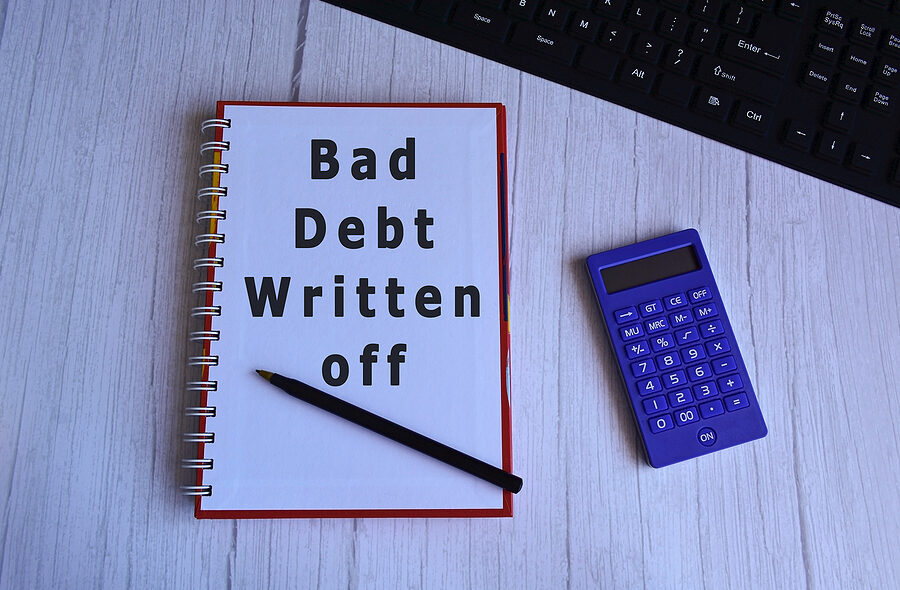According to the U.S. Government Accountability Office, the amount of credit card debt consumers face has reached a record high with consumers owing more than $1 trillion to credit card companies. It comes as no surprise that many people are looking for ways to escape their debt, if at all possible, which leads one to the question: is it possible to get credit card debt written off?
The answer is yes, but it is not a simple yes. The process can involve negotiations with credit card companies or debt collection agencies or even legal proceedings.
Debt Settlement Services
One way to get credit card debt written off is through debt settlement services, although this is not always the best way to go. How the process works is this: The consumer immediately stops paying his or her creditors when he or she signs up for a debt settlement program. Instead of paying his or her creditors, the consumer pays the debt settlement company who puts the money in a savings account until enough money is collected to settle the consumer’s debts. Once enough money is saved, the debt settlement company begins working with the consumer’s creditors in negotiating down the debts in hopes of settling them for less than what was originally owed. Lenders are under no obligation to work with these companies, but oftentimes they do because they do want to get paid something in lieu of nothing.
Once the creditor is paid the settled amount, the debt is cleared. Keep in mind that the amount that is written off or settled is considered taxable income for IRS purposes so the consumer will need to report all settled debts to the IRS for tax purposes.
Debt settlement can take several months, if not years, to complete, and lenders or creditors are under no obligation to participate. Occasionally this results in collection lawsuits against the consumer on the debts owed instead. Because of how long the debt settlement process takes, the effect it can have on a consumer’s credit score can be rather significant.
Bankruptcy
Bankruptcy is another method by which to have credit card debt written off. With a bankruptcy case, the consumer gets to take advantage of the automatic stay, which puts an immediate stop to any pending collection action against the consumer, and the consumer can work with the bankruptcy trustee on paying down qualifying debts and discharging those that are left over. With a Chapter 7 bankruptcy case, which takes several months to complete, assets are liquidated and used to pay down qualifying debts, leaving the remaining debts discharged at the end of the case. These discharged debts usually include unsecured ones, such as credit card debts. With a Chapter 13 bankruptcy case, the consumer works directly with the bankruptcy trustee to create a repayment plan to pay down his or her debts over the course of three to five years, discharging the remaining debts at the end of the repayment period. At the end of both types of bankruptcies, the consumer is able to walk away with a fresh financial start and a clean slate. Unlike with debt settlement, the discharged debt in a bankruptcy case is not taxable income per the IRS.
While, yes, the consumer’s credit score will also take a hit with a bankruptcy filing, a bankruptcy case is looked up less harshly than a default, and the consumer will be able to successfully rebuild his or her credit score over time with good financial habits following a bankruptcy.
If a consumer is struggling with debt and is unsure of which route to take, it is always best to consult a legal professional to discuss his or her options. An attorney can look at the person’s situation and can advise him or her on whether bankruptcy is appropriate or whether other options may be best at this point in time.
As bankruptcy attorneys, we see credit card debt as one of the most common problems facing those with serious financial challenges. It is not surprising with the high interest rates, unreasonable fees, harassing debt collection calls, penalties and never-ending minimum payments that do not even make a dent in your actual debt.
Filing for bankruptcy is a viable option for those struggling with insurmountable credit card debt. Chapter 7 is the fastest form of consumer bankruptcy and forgives most unsecured debts like credit card debt, medical bills, and personal loans. There are certain qualifications a consumer must meet in regard to income, assets, and expenses to file for Chapter 7 bankruptcy, which is determined by the bankruptcy means test.
Please click here to read more.
If you have questions on this topic or are in financial crisis and considering filing for bankruptcy, contact an experienced Miami bankruptcy attorney who can advise you of all of your options. As an experienced CPA as well as a proven bankruptcy lawyer, Timothy Kingcade knows how to help clients take full advantage of the bankruptcy laws to protect their assets and get successful results. Since 1996 Kingcade Garcia McMaken has been helping people from all walks of life build a better tomorrow. Our attorneys help thousands of people every year take advantage of their rights under bankruptcy protection to restart, rebuild and recover. The day you hire our firm, we will contact your creditors to stop the harassment. You can also find useful consumer information on the Kingcade Garcia McMaken website at www.miamibankruptcy.com.

